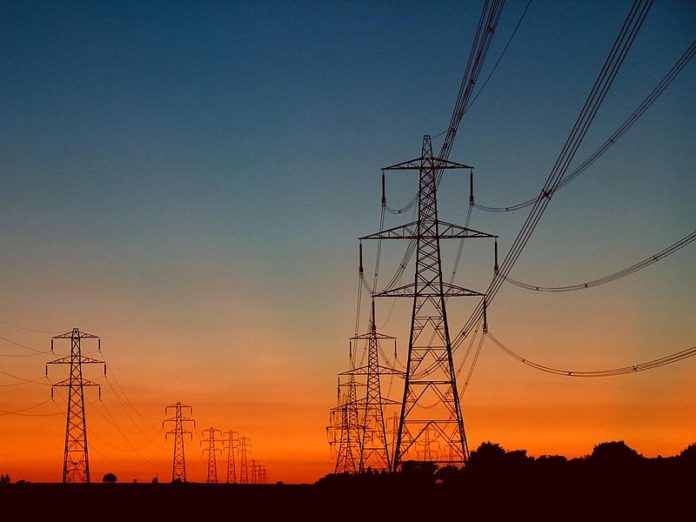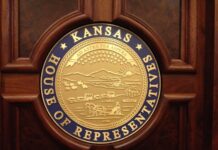Evergy is asking utility regulators to sanction the lawyer for a group of large industrial power users for allegedly revealing the existence of a confidential document, an accusation the attorney decribed as “incendiary.”
The utility company accuses attorney James Zakoura of telling a news reporter about the document, which was filed with the Kansas Corporation Commission.
He is not accused of disclosing the contents of the document so much as he is accused of divulging its existence.
“We are not happy about this,” said Chuck Caisley, senior vice president of marketing and public affairs for Evergy.
“This is the first time in 15 years in this industry I’ve seen somebody do something like this,” Caisley said.
The document was filed with the KCC as it reviews the company’s sustainability transformation plan, a $9 billion roadmap for modernizing the utility’s grid, investing in renewable energy sources and cutting costs.
Zakoura is the lawyer for the Kansas Industrial Consumers Group, which is made up of a number of large companies including Cargill, Spirit AeroSystems and Goodyear Tire.
Zakoura said the charges are untrue and divert attention from questions of whether the company’s sustainability plan will benefit the public.
“They cite absolutely not one shred of evidence in support. It’s simply rank speculation,” Zakoura said.
“It serves no purpose other than to take away attention from the main focus of the KCC docket, which is whether the Evergy’s $9 billion expenditure program is in the public interest,” he said.
The Kansas Industrial Consumers Group, in its response filed with the KCC, said the accusations have no merit.
“KIC denies all allegations of wrongdoing and condemns this unwarranted procedural attack,” Zakoura wrote in his response to the KCC.
“There is no basis for Evergy’s allegations in law or fact. KIC’s discussions with a reporter did not reveal confidential information.
“There is no basis for imposing any sanctions on KIC.”
The industrial consumers group has been at odds with Evergy in recent years in an effort to drive down electric rates, which the company says have been declining.
Two years ago, both sides clashed in the Legislature over a proposed electric rate study that the utility company said was an attempt to tilt rate-making in favor of large customers.
The motion does not detail the contents of the document but says the reporter “pressed” the company for access to the information after learning about the record from Zakoura.
“The only way the reporter would be aware of what this confidential document contains would be if it was described to her by KIC’s attorney,” Evergy’s motion said.
“Although the reporter did not have the specific numbers contained in the document, she was aware of its existence and of the general description of its content.
“Mr. Zakoura’s description of the existence of a confidential document to the reporter is a
violation of the terms of the protective order,” the motion states.
The utility company says that the industrial consumers group’s attorney constantly pushed to make Evergy disclose confidential documents during the review of the sustainability transformation plan.
“Evergy has cooperated with these requests to the greatest extent possible while still
maintaining appropriate confidentiality designations for nonpublic financial, business, and
strategy information and forecasts,” the company said in its motion.
The company said the industrial consumers group has been provided with access to all of the material produced in the case.
Evergy says Zakoura’s clients can sign nondisclosure agreements and have access to that same information.
“Evergy is simply maintaining the confidentiality of certain documents as appropriate under the commission’s rules and under the rules and regulations applicable to public companies’ disclosure of material non-public information.”
Zakoura said the document that is the subject of Evergy’s complaint is not confidential.
Zakoura’s filing said Evergy agreed to make the document public in a PowerPoint presentation at a workshop held by the KCC to discuss the sustainability plan.
“Put simply, Evergy accuses KIC of violating this proceeding’s Protective Order by discussing information Evergy agreed should be considered public,” Zakoura said in his filing.
“The commission must reject Evergy’s incendiary charge,” he said.
In a newspaper column that was published at the end of January – the day after Evergy filed its motion seeking sanctions – Zakoura said Evergy had labeled all the documents “confidential” in the case.
“Sadly, the KCC has let them, keeping the important document hidden from view by the governor, lawmakers, the bill-paying public or the media,” Zakoura wrote.
Caisley said it was not known whether contents of the document were made public. He said that was irrelevant to the motion filed in this case.
He said Zakoura could not disclose the existence of the document at that level of detail.
The company, he said, sees no difference between revealing the existence of a document and discussing its contents.
“We don’t see a distinction and the reason we don’t see a distinction is because the existence of documents that we have provided confidentially for the types of information they contain are protected as confidential and should not be disclosed,” Caisley said.
Zakoura said nothing improper occurred.
“KIC has not improperly disclosed confidential information or violated this proceeding’s Protective Order,” he wrote, “because the document in question: (1) is public, and (2) is not discovery because it was provided in a public meeting and filed in this docket.”
In its motion filed with the KCC, Evergy wants regulators to admonish Zakoura to “refrain from disclosing the existence of or contents of confidential material obtained through the discovery process to anyone who has not signed a non-disclosure agreement…”
It also wants the industrial group’s access going forward to be limited to only public
material and not material designated as confidential.















